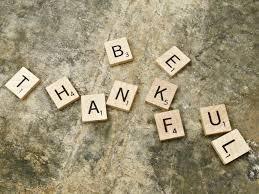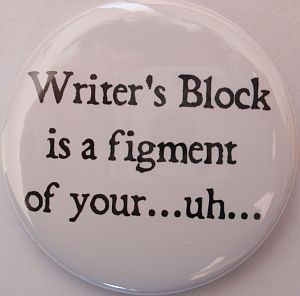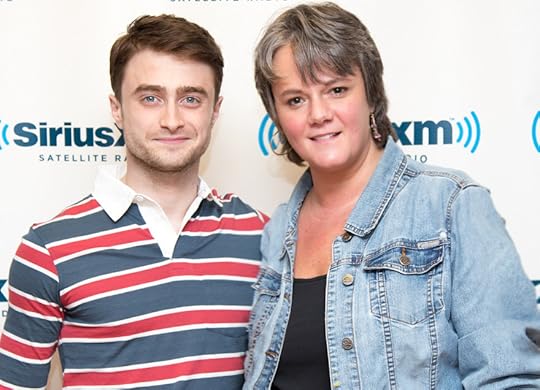Christy Potter's Blog, page 13
November 27, 2013
When you’ve forgotten how to be blessed
Sometimes I think I’ve forgotten how to be blessed, how to acknowledge and appreciate all that I have. I get so preoccupied by the slow-running bathroom sink, tiny lines around my eyes, my missing reading glasses, underarm jiggle, and a jagged mountain of work frustrations that I don’t step back and see the bigger picture in my life.
It’s easy to see those blessings that have come along and kicked your door down and jumped on your lap. Even things like a roof over our heads and enough to eat are what we may rattle off when someone challenges us to “count our blessings,” as if they’re jelly beans in jar and you’re trying to win the contest. I don’t count my blessings anymore. I find that when I’m focused on how many blessings I have, I’m still missing the point. If you only have one thing in your life that makes you feel blessed, aren’t you every bit as blessed as the person who is waving around a list of a hundred? I think so. Perhaps even a little more.
As I sit here watching the late autumn sun, which wasn’t all that committed to being here today in the first place, slip away and cover the trees’ hold-out leaves in an early darkness, I feel the approach of Thanksgiving. And it’s with a Herculean effort that I put aside the financial stresses of the holiday season, the nattering of my neighbor about the winter storm we may or may not be getting soon, and the endless lectures on my Facebook wall that strive to make sure I’m sufficiently aware of and sorry for the Trail of Tears, stores that are open on Thanksgiving, the greedy capitalist machine that created Black Friday, tofurkey, all those who say “Happy Holidays” as a clear act of unbridled aggression against the Baby Jesus, and those who think someone saying “Merry Christmas” constitutes a hate crime, and I quietly ask myself… for what am I most thankful this year?
The list is not as long as some would tell me it ought to be – it’s much easier to see everyone else’s blessings more clearly than your own, isn’t it? But the blessings I’ve pulled here into a little pile to sort through and smile at are important. They are the very foundation of my life. My strong, healthy body. My family and friends. My writing. My faith. My ability to love and be loved. Those who came before me, those who will follow.
There is a moment, when you’ve put everything else aside and are looking, with clear eyes and an open heart, at the good in your life, when you suddenly realize just how lucky you are. It’s that merging point, when all those bits come together and your breath catches and your chest constricts a little, and you just think, “Thank you.” That moment, that precise, perfect moment, is your greatest blessing.
Happy Thanksgiving, my friends.
November 22, 2013
From 98 Degrees to “Men of the Strip,” Jeff Timmons talks Vegas, baby!
A lot of things have changed for Jeff Timmons since his days as a member of 98 Degrees, when he made young girls swoon and weep with songs like “I Do,” “Because of You” and “The Hardest Thing.” Now 40 years old and a father to his own teenaged daughter, Timmons has gone from the boy band scene to, well, something a little more grown-up.
I spoke to Timmons recently about the new show he created, called “Men of the Strip.” At first blush, I know it sounds kind of raunchy, but it isn’t. (No, really. My mother, my aunt, and three of my former Sunday School teachers read this blog, for crying out loud.)
“Men of the Strip” bills itself as “an explosive and multi-faceted new live male revue entertainment extravaganza.” But I wanted to get behind all the muscular chest shots, glitzy Vegas adjectives and gorgeous choreography. I wanted to find out what made Jeff decide to create such a show, what went into it, how it’s all come together, and how often I can get backstage. (I KID, I kid.)
“It’s a great show, an amazing production, it’s high-end, high-quality theater with what basically amounts to a grown-up boy band,” Jeff told me. “Look at it this way. When I was in 98 Degrees, we were singing to the girls, sometimes taking our shirts off. This is basically the same thing, only now the girls who used to watch us on Nickelodeon are now 22 or 23 years old and having girls’ night out with their friends.”
Mind. Blown.
“Men of the Strip” is a contemporary take on the Chippendales, the classic male revue which Jeff hosted a few years back in Las Vegas. That’s where the idea for the new show was actually born.
“It was a sold-out run the entire time I was there,” he said. “The Chippendales have their own brand, so I just thought why not create a new one, and make it more about the music and singing?”
So he teamed up with “Money Mike” Foland and Glenn Douglas Packard. Foland is a former wrestler turned entertainment industry wizard, and Packard is an Emmy-nominated choreographer and producer who has worked with Michael Jackson, P!nk, Usher, Missy Elliot, Whitney Houston and Ricky Martin. Together, the “boss men” held auditions in New York, Las Vegas, Miami, and Los Angeles until they finally had their dancers together.
“We’ve created a show that’s young, hip, more mainstream, and current,” Jeff said. “That’s why I call it a grown-up boy band. The guys sing, they dance, they go out in the audience and dance with the girls. It’s not raunchy or grindy. It’s not what you think of when you think of male strippers.”
And in case you’re wondering, Jeff does some singing as well, including the hits that put 98 Degrees on the map. Speaking of the boy band days, lest you think he has put all that behind him, he just finished a tour with the guys last summer, and he’s still friends with other boy band heartthrobs of the 1990s, like the Backstreet Boys and *NSYNC.
“Justin (Timberlake) was actually at our show in Columbus last night,” Jeff said. “We got him to get up and sing with us. It was great.”
In the meantime, “Men of the Strip” is continuing to heat everything up, working on getting their name out and building their brand. Keeping with the “grown up boy band” theme, the dancers in the show have cute nicknames, like the ones teenaged girls tend to give their heartthrobs, like “Latin Lover,” “Mama’s Boy,” and “Heartbreaker.”
The men are in the midst of doing intimate, buzz-generating meet and greets that allow ladies of all ages to hang with the multi-talented stars of the show. In the months leading up to the launch of “Men of the Strip” in Vegas, each of the performers will be creating their own individual brands in addition to helping develop the branding of the franchise.
Besides introducing “Men of the Strip,” these events, scheduled to run through the holiday season, will include performances by Jeff (who performs some of his own music as well as hits from 98 Degrees) and a few steamy, high-energy numbers with the cast to tease the Las Vegas mega-show.
A second leg of the tour, scheduled for 2014, is still to be announced. In conjunction with these live events, Jeff and his team are developing a fascinating, behind the scenes “docu-series” about the creation and development of “Men of the Strip” and the real lives of the eight performers.
“It is just really fun,” Jeff said. “It’s different, doing something that’s a little irreverent. So far the reaction has been phenomenal. We haven’t had one bad review. I’m keeping my fingers crossed.”
When he’s not working, this former teen heartthrob is all grown up and married with a blended family of four kids. His 14-year-old daughter, from his previous marriage, was born after the heyday of 98 Degrees, but she still likes listening to their music. Well, most of the time.
“She tries to hide that she likes Justin Bieber and One Direction,” Jeff told me. “She says ‘No, Dad, only your music!” and then I catch her sneaking off to listen to the stuff she really likes.”
That’s all right. Something tells me Jeff and his new crew will have no shortage of grown-up fans.
For more information on “Men of the Strip,” including tour stops for the rest of 2013, bios on dancers, and how to order a 2014 “Men of the Strip” calendar (which you’ll want to buy as a gift for your favorite blogger, right?!), visit www.menofthestrip.com.
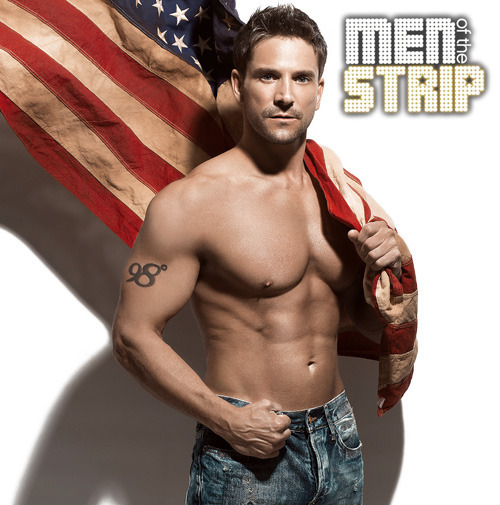
Jeff Timmons
For a behind-the-scenes peek at “Men of the Strip”…
Click here to view the embedded video.
And finally, for little throwback magic, here are Jeff and the boys being all dreamy and swoony…
November 18, 2013
Nancy Fuller keeps it real on Food Network’s newest show, “Farmhouse Rules”
If you’ve ever realized that watching chef after chef create aiolis and ceviches and gastriques makes for entertaining television but isn’t particularly relevant to what you do at home in your non-professional kitchen, you’re going to love Nancy Fuller.
Star of the new Food Network show, “Farmhouse Rules,” Nancy is as nice, as down-to-earth as they come. She’s a mother of six and a grandmother of 13, a farmer, and self-proclaimed “big girl” who likes to cook and likes to eat. I spoke to Nancy last week on the phone from her farm in Hudson Valley, New York, and she told me about her new show, her family, and her life. She and her husband own Ginsberg’s Foods, an award-winning, multi-million dollar business. Now, on top of that, she’s got her new show. Yet when I asked Nancy to tell me about herself, her immediate response was, “I’m a dairy farmer.”
Now that’s what I call keeping it real.
“I grew up on a dairy farm, I raised my kids on a dairy farm,” Nancy said. “I’m now the executive vice president of a big company, but my farming foundation gives me the impetus and the strength to do all that I do.”
And she does plenty. Between farming, helping to run Ginsberg’s Foods, taking care of her family, and now filming “Farmhouse Rules,” life is keeping Nancy hopping. But don’t expect fame to change her.
“I’m an old, fat lady with her principles about her,” Nancy joked. “We may live on a farm, but I expect people to put their napkins on their laps.”
Something else that’s important to Nancy: making sure people understand what “farm to table” really means.
“We dig potatoes, we wash them, we put them in water to cook,” she explained. “You’d be surprised how many people don’t think about the fact that potatoes come from the ground, not the grocery store. Some people really think that red potatoes are little potatoes that are dyed. I had someone tell me once that chocolate milk comes from brown cows.”
Her show takes viewers through the process from picking to cooking, as Nancy gathers local food from her own farm and the surrounding area, then turns it into down-home comfort food for her family. On one episode, for instance, they visit a peach orchard and pick peaches that they take home and make into a cobbler.
“It’s a little bit of reality TV, a little bit of cooking, we set a pretty table,” Nancy said. “It’s letting people see that they can do it, because I’m doing it. I’m not just standing there and preaching.”
She calls her simple cooking method “chop, chop, in the pot.”
“We’ve had a lot of the whole fancy, formal food preparation, and I want to get away from that for the masses, so they can chop, chop, in the pot and be done with it,” she said. “It’s good. It’s real. It’s still a stew, but done with a simplicity that anyone can do.”
Busy parents in particular will appreciate Nancy’s style, as she juggles family responsibilities, the farm, and the couple’s business. But she makes it all work, and does it with a smile.
“I kind of take things in stride,” she said. “Whatever I’m doing, I just do it. I get it done. I think that comes with age. I’m 64 and I’ve worked like a dog. I don’t feel like I owe anyone any apologies for being who I am. I’m very confident and very happy. When you’re that kind of person, you’re blessed.”
As for her show, which premiered this past weekend, Nancy said it’s not only about simple cooking and farm-fresh food, it’s about giving back – both by showcasing the abundance the Hudson Valley has to offer and by helping people see how simple it really can be to spend quality time with their families.
“It’s about giving back, helping people, getting good food into them, and gathering around the table with your family,” Nancy explained. “I think that’s important. If you can’t do it every night, do it at least a couple of nights per week. When my kids were younger, it was every Sunday. Step back, look at your children, and you’ll see how important it is. Take away the technology for an hour. It’s not a lot to ask. I’m hoping that people will see that on my show, and get to know me and understand what I’m doing. I think it’s going to be a success because it’s meant to be.”
“Farmhouse Rules” airs Sundays at 11:30 a.m. (EST) on Food Network.
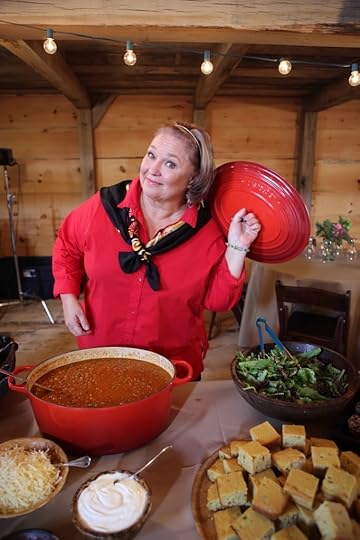
Nancy Fuller, star of “Farmhouse Rules”
Photo courtesy of Food Network
November 11, 2013
The inspiration and street art of Chor Boogie
I’ve written about all manner of artists for this blog, from musicians to writers to chefs. But last weekend was the first time I, on the quest for a new source of inspiration, have ever walked up to a man painting on a wall with a can of spray paint, right in the middle of New York City. And I walked away with a whole new appreciation for street art and the beauty of the human and creative spirit.
The time I spent with artist Chor Boogie, in an empty building in midtown, right across the street from Bryant Park, gave me insight into street art that I’d never had before. The 35-year-old San Francisco-based artist is in New York for ArtBattles, an international competition that pits street artists against each other in epic battles of spray paint and creativity.
Chor, who tells me with a sly grin that his name is taken from the fact that painting is his “chore” and his “boogie,” is one of several artists painting on the building’s wall, but his style is unmistakable. A nearly floor-to-ceiling skull is swirled through with his trademark use of color, from bright purple and blue interspersed with plenty of black, down to the suit and what is on its way to becoming a red,white and blue bow tie the psychedelic skeleton is wearing.
“He’s a corporate zombie,” Chor says, studying his work. “It’s my tribute to the working man. We’re all zombies, really, don’t you think? We get so caught up in making a living that we forget about the rest of our lives.”
I admit that I do. Chor says he does as well, making me feel a little better at knowing that even a free-spirited street artist can become a slave to what drives him. We connect over our respective arts, Chor and me, although it doesn’t take me long to wonder if “Christy Potter” is a catchy enough name. I think I need a cool writer street name. Inky Scribbles, maybe.
Chor remembers telling his kindergarten teacher he was going to be an artist. The revelation came after she gave the kids a choice between playing “Duck, Duck, Goose” and painting. He chose painting, as anyone who had to be the maddening Goose even once in that stupid game most likely would have. He painted a full-body self portrait, which was “a big sloppy mess,” but alive with color. His love affair with color has never waned. Next to the zombie is his trademark “Boogie Bird,” a round, red little dude who was born way before any Angry Bird came along.
He is refreshingly honest about his past, and the substance abuse that led him to take a break from art for several years. Now, he says, after a deep spiritual healing and recovery, his focus is entirely on his art, and that’s evident in what he’s created here in New York City. The face is visible as I look straight at it, but when I take in the bigger picture, the details merge into the color and I start to feel what the artist is saying. It’s a blend of internal and external, looking inward and outward. This isn’t graffiti – don’t even call it graffiti. This is art, in the same way the Renaissance artists Chor studied put brush to canvas.
“I don’t consider this graffiti,” he tells me, after I use the “g” word. “I call it modern hieroglyphics. I call it street romantic voodoo.” The hieroglyphics comparison catches me off guard. I can’t believe I’ve never thought of that. He can tell he has intrigued me, and gives me that disarming smile again. “Even the burners (usually those who write words in elaborate letters and colors on the sides of bridges and such) are a lot of times really creative and beautiful with what they do.”
“Yes,” I admitted. “They have gotten really good lately.”
“They’ve been good,” he corrects me. “They’ve been good for a long time.”
I think back to the wild slashes of spray paint I’ve seen over the years, and their evolution from hastily scrawled expletives to the truly artistic lettering and pictures, and I realize he’s right. The scrawls, he said, okay. Yes. Those you can call graffiti if you want. But overall, he considers that a government-created negative label. And in truth, what would once have been considered graffiti has become recognized as an art. Some business owners, particularly in big cities, often commission work on the side of their building.
Which brings me to my next question.
“Banksy,” I said. “A help, or a hindrance?”
Chor can’t really answer this, probably any more than I could if someone asked me the same question about J.K. Rowling. He does says that the enigmatic British street artist has helped bring their type of art into the mainstream. The hard part, I suspect, is the constant comparison. Banksy’s recent appearances in New York City probably don’t help matters. Chor shrugs it off and points to two other artists, working on a scissor lift next to his corporate zombie. Phase 2 and RIFF 170, he says, are pioneers in street art.
“If I wasn’t for them, there wouldn’t be a Banksy,” he said. “If I wasn’t for them, I wouldn’t be here. They are the ones I look up to.”
Make no mistake, others look up to him now. With nearly 73,000 fans on Facebook and almost 3,000 followers on Twitter, he knows how to get his name out there. But as any artist knows, name recognition is one thing. A catchy moniker and a strong social media presence will only get you so far, but if you don’t have the talent to back it up, you’re in trouble. For Chor, it all comes back to the art.
“I’m throwing magic up there on the wall,” he said. “That’s what it is to me. Magic. I hope it inspires somebody, helps somebody, changes somebody.”
November 8, 2013
On Sylvia Plath and Puss in Boots
“I can never read all the books I want; I can never be all the people I want and live all the lives I want. I can never train myself in all the skills I want. And why do I want? I want to live and feel all the shades, tones and variations of mental and physical experience possible in life. And I am horribly limited.” Sylvia Plath
~
You’d think I don’t have enough to do. You’d think I spend my days sitting around saying, “Wow, I’m just so incredibly bored,” and my nights watching Seinfeld while eating Doritos and Skinny Cow ice cream sandwiches – okay, well, that part is true. But I am not bored. I have more to do than I probably should, and yet… and YET… I have just agreed to be the stage manager for our community theater’s upcoming production of Puss in Boots.
This is something I do. Right when I am on the verge of being completely overloaded, I find that one thing that just sounds like so much fun that I can’t resist adding it to the top of the pile, with a “ta-daaaa!”
I have always done that, but I’ve never known why. But today, finally, I’ve figured it out. I want to do so much because there is so much to do.
I blame the people around me. I’m surrounded by creative, wonderful people who make my life richer just by being in it. I’ve always gravitated toward quirky artist types, and thanks to being a writer, I often get the chance to delve into their psyches a little deeper than most. What I’ve finally realized, though, is that these people, and this life I’m leading that is absolutely steeped in art and beauty, has just made me want more. Like Plath, I want to live and feel all the shades and tones and variations.
I seek out things that fulfill me – things I want to do, not things I’m expected to do. And if you’re honest with yourself, you know there is a difference. For me, well, I volunteer at a local arboretum, where I find peace just walking the grounds. And the community theater, where my soul soars every time the stage lights come on. I read the writers I most admire with a voracity that hovers somewhere between study and worship. I meditate to connect myself with the moment I’m in, I exercise for the sheer joy of feeling the strength of my body, I watch Nora Ephron movies to remind myself what falling into new love is like, and the other day I put a thin slice of freshly-shaved Parmesan cheese on my tongue and almost cried because it was so amazing.
It’s easy, I think, to get overloaded with the wrong things, and that’s happened to me as well. Those are the things you peel off and throw aside, like a wool sweater that itches. But when you find your life bursting at the seams with wonderful bits of beauty and art and love… how are you ever too busy for one more little piece of it?
November 1, 2013
The timeless inspiration of Graham Russell and Air Supply
It’s one thing to be a little nervous before a big interview. It’s happened to me before, it’ll happen to me again. But what coursed through my veins on Friday afternoon before I interviewed Graham Russell of Air Supply transcended mere nerves. It was a heady blend of excitement, giddiness, a pinch of disbelief, topped off with a big splash of fangirl juice that’s been fermenting for 30 years.
From the moment I heard “Lost in Love” on the bright orange 8-track tape in the stereo back in 1980, I was an Air Supply fan. I’m not even sure “fan” is the right word, actually, because I lived and breathed this band. Every concert I could make it to, every album, every t-shirt, every poster I could get, I got. I knew every song, from the first note. I knew their middle names, I knew their hometowns, I knew their tour schedule. I fell asleep to their albums on my turntable. I had hot air balloon pictures and stickers plastered everywhere. I had “AIR SUPPLY” written on my denim notebook because it was important, you see, for all the other girls at my school to know it was okay if they also loved Air Supply, just as long as everyone understood that they were my band. I hope you’re getting the idea here. If a hairshirt had been a requirement, I’d have bought six.
I loved all the boys in the band, of course, and I really loved the lead singers, Russell Hitchcock and Graham Russell, but I always had a particular weakness for Graham. Maybe it was the English accent. Maybe it was his distinctive voice, a strong tenor with a soft side, like he’s singing through a gossamer cloud. Maybe it was the guitar. Whatever it was, Graham held my heart. I remember asking my mother, basically all the time, to be sure and get graham crackers and Golden Grahams cereal so I could cut out the word “Graham” on every package for my scrapbook.
Air Supply provided the soundtrack of my teenage years. For every first date, every school dance, every broken heart… they were there. Their music was comforting, familiar, always a port in my adolescent storms. Even as I grew up and started to make my way in the adult world, they came with me. I bought every new album they put out, on cassettes for my Walkman, then on CD, now they’re on my iPod. They have always just been there with me, a part of my life, a part of my whole identity.
So when I saw the marquis outside my local performing arts center announcing their concert here on November 8, I first was disappointed. Money is just too tight right now for luxuries like concert tickets (even though, you do realize, an Air Supply concert is not so much a luxury as a necessity, ranking just slightly more important than water). But after about three seconds’ worth of self-pity, I said, right out loud, “Oh, screw that. I’m Christy Potter, and this is Air Supply we’re talking about.” And I got on the horn with the theater’s press office and asked for an interview. It took some wheedling, but I got it. Then I found out my interview was going to be with Graham, and I couldn’t feel my legs for a second. By the time Friday rolled around, 80′s Fangirl Christy and Journalist Christy were waging an epic battle in my head.
80′s Fangirl Christy: “Like, ohmigod, I’m totally going to call Graham Russell, like, Graham Russell of Air Supply, like, on the phone, like ohmigod!”
Journalist Christy: “It’s an interview, you nitwit. You’re a writer. You do interviews all the time. Grow up already.”
80′s Fangirl Christy: “Ohmigod, like, shut up. You’re, like, old and stuff. Gag me with a spoon.”
This went on right up until I dialed the phone and Graham answered. I wasn’t sure what to expect – except possibly a coronary on my end of the phone – but he was warm, friendly, engaging, and incredibly sweet. He also found it amusing that I was so jittery.
“There’s no need to be nervous,” he said, sounding all English and Graham-like and sending 80′s Fangirl Christy into a paroxysm of shrieks on the floor of my brain.
We talked. And we talked. And we talked some more. It was less an interview and more a conversation. I’m writing an “official” article about it for the paper, so I won’t give away all the details here, but this is where I can tell you the things I can’t say in the paper. This is where I can tell you how it felt to spend that time on the phone, one-on-one, with someone whose music, whose art, has always found a way to touch me.
I was so comfortable with him that I took him into my confidence and, after making him promise not to tell Russell because he might get terribly jealous and of course we can’t have that, told him I’d had the biggest crush of all on him. He laughed and seemed flattered, but naturally I wanted to make sure he knew I meant it. Really, really meant it. And so, I kid you not, I told him about all the “Grahams” I cut off cereal boxes and packages of crackers and put into my scrapbook and all around the Air Supply posters on my wall.
“Oh my,” he said, no doubt wondering at this point if I might be dangerous. “You did have it bad.”
Journalist Christy: “There, are you satisfied? I told him about your stupid cracker thing.”
80′s Fangirl Christy: “Ohmigod ohmigod ohmigod ohmigod!”
We talked about Air Supply as a band, one whose undeniable success shaped, even defined, the soft rock sound of the 80′s. I told him about all the concerts I spent squished against the bottom of the stage, hands in the air, screaming and crying in a tornado of emotions and hormones that could only be fully understood by my fellow tornadoes, screaming and crying next to me. I couldn’t believe I was telling him all this. What’s more, I couldn’t believe he got it.
“I like hearing that,” he said. “Our music has become the soundscape to people’s lives, and of course it is to ours as well. It’s so genuine, what we see in our fans. Every night we get to see them laugh and cry. We see them light up when we start certain songs. We hope to never forget our beginnings. The fans bring you to where you are. It’s all about them.”
We talked about his enduring friendship with Russell, with whom he said he’s “never had an argument.” We talked about how they stay relevant in today’s music world, to which he responded “If we want to try something new, we just do it. At this point in our careers, we can take chances. I mean, we’re still Air Supply. If people don’t like it, then they don’t like it and we’ll try something else. But they’ve embraced it.” Something new, incidentally, includes a dance track that’s coming out later this month. They’ve brought it out at some recent shows and, he said, the audiences love it. “How about that?” he mused. “I wasn’t sure they were going to, but they’re really flipping out over it.”
80′s Fangirl Christy: “A dance track! OHMIGOD! Am I, like, going to have to learn to twerk now?”
Journalist Christy: “Go to your room.”
He told me about the new album they have coming out for their 40th anniversary, and about three new musicals they’ve got gearing up to take the stage: one in Michigan, one in Australia, and one in Korea.
“It’s like we’re entering a new phase of our careers,” he said with his easy laugh. “We’re incredibly grateful to still be able to do this. You can’t mistake passion, and our fans know it’s real. We love what we do.”
By this point, I knew I’d kept him as long as I’d dared, so I thanked him for his time, and for the amazing interview. Then I hesitated. It didn’t seem like enough. What do you say, in a moment like that, to someone who has been such a huge part of your life, for so long? How do you thank him for all the swooning excitement, for the untouched innocence in every moment he was there for? How do you thank him for a memory full of music? The right words wouldn’t come. Instead, I asked him if he’d do me a favor.
“What’s that?” he asked.
I quietly sang the first few words of my favorite lyric from “All Out of Love.” I could hear his smile as he started to sing.
“I wish I could carry your smile in my heart, for times when my life seems so low…”
There was a moment’s pause.
“Thank you,” I said. “You just brought my entire adolescence back to me.”
“I’m glad, my dear,” he answered.
When we hung up, I couldn’t have stopped my whirling emotions with both hands. I started to cry. Then I got up, put “All Out of Love” on the stereo, and put my arms around 80′s Fangirl Christy. And we danced.
October 25, 2013
The inspiration of Ching-He Huang
When I met Ching-He Huang, my first impression of her was the same as it was the first time I saw her Cooking Channel show, “Easy Chinese.” She is sweet, smiley, talented, petite, beautiful, and wields that sriracha bottle like a boss.
It’s been almost a year since I sampled her Pearly Pork Balls and spicy chicken pitas in the Food Network kitchens, and I’ve not only grown to admire Ching even more, I now consider her a friend.
But first impressions and friendship aside, I’m wondering if I’m ready for a side of Ching I’ve never seen before – the tougher side, the down-to-business side, the Ching who shows there’s more to Chinese women than big smiles and steamed dumplings. Ready or not, that’s what I’ll be seeing next week when her new show, “Restaurant Redemption,” premieres on Cooking Channel.
I talked with Ching earlier this week from her home in London about the new show, and what we can expect. Most restaurant-makeover shows feature guys like Robert Irvine and Gordon Ramsey shouting, swearing, and throwing things as they attempt to make often grievously thick-headed restaurant owners understand why their business is failing. Try as I might, I just can’t see Ching doing any of that.
“I’m not like Gordon – I don’t swear. Well, I do, but only when I’m stuck in traffic,” she joked. “But you will get to see a different side of me, the tough side.”
During the course of the season, Ching travels to Asian restaurants in eight different states and helps people who need it to not only turn their struggling restaurants around, but to understand how to keep the success going, and perhaps more importantly, how to be true to their culture.
“It’s been rather challenging because everyone is so different,” she said. “And what each restaurant is facing is different as well. Some of them are family businesses that are struggling, maybe a new manager has taken over but doesn’t know what to do, maybe they’re two months from closing down due to their finances.”
Her frustration shows itself when she sees people wasting the opportunities they have.
“Sometimes it’s hard because a lot of these people have been doing the same thing for years,” Ching said. “I come in with new eyes and I can see what they’re doing, and I can see what they’re capable of. I want to empower them. When I do get mad, it’s because I’m just so frustrated at seeing them stuck in their own negativity and contributing to their own demise.”
She tells them they need to really focus on what they’re good at. It sounds like a simple enough message but it’s one that many restaurateurs, believe it or not, are not quick to follow. Despite knowing their restaurant is anywhere from struggling to very shortly doomed, these chefs often hesitate to make the food they know best.
Ching not only recognizes this, she understands it, perhaps better than most. When I first met her, the Taiwan-born, England-raised chef told me about the struggle with her own cultural identity, from her younger years wishing she could be a blonde-haired, blue-eyed Brit through finally embracing her Asian heritage and showcasing it in her food. Now when she sees restaurant owners putting aside the tastes of their own cultures in the name of trying to please American palates, it bothers her.
“I’ve come to realize that what we make as chefs and cooks is really a reflection of ourselves,” she said. “It’s a reflection of your inner being and what’s going on in there. It’s almost like a mirror. At a lot of the places I visited, I met restaurant owners who have been through their own cultural identity struggle. They are willing to do anything but put their culture on the plate. They only put out what they think customers want. Yes, to some degree you have to listen to your customers’ feedback, but you have to take pride in your heritage and culture. You have to believe in your ability to put out great food that’s reflective of that culture.”
To those Asian cooks who are unsure they want to offer their customers anything other than eggs rolls and General Tso’s Chicken, Ching challenges them to think outside the takeout box.
“Part of our job as cooks and chefs is to educate the public about the foods of our culture,” she said. “We shouldn’t be afraid to say this is a traditional dish, these are the ingredients we use, these are the spices. I think a lot of these people have faced prejudice, so now they shy away from putting their culture on the plate. They’re afraid to put the food they know best right there, front and center.”
Ching’s nurturing nature comes through when she’s discussing that cultural identity struggle, and her empathy makes her more determined to nudge them forward in their thinking, as well as in their cooking. “They just need someone, a coach or a cheerleader, to say ‘You can do this!’ or ‘Your knowledge of Laotian food is so amazing – why are you doing Japanese?’”
She thinks of herself as these restaurant owners’ friend and mentor.
“All of us need that sometimes in life,” she told me. “I’m really rooting for them. For me, everything we do on this show is about what’s best for them, what’s in their best interest, what’s best for their happiness and their creativity.”
Because cooking, like writing, is an art, Ching and I have found still more common ground. She believes in pushing herself, in trying everything from new dishes to new TV shows, in an attempt to see how high she can soar. We talk about the importance of moving into unfamiliar territory in our art, and the thrill of finding something new you’re good at. That’s the adventurous spirit Ching tries to impart to the restaurants she visits on the new show.
“It’s rewarding to see them reach the moment of ‘Aha! I am good at this! Of course I can do it!’ They turn around and start to believe in themselves again. It might be a dish, an ingredient, a story from their childhood, or it might be just that they’ve lightened the load by sharing a problem they’ve had for many years.”
The new show has been a tremendous learning experience for Ching as well.
“Every day I’m learning as an artist – that’s what I call myself now,” she said. “And this new show is really helping me learn and grow. And I’ve grown a lot. When Cooking Channel first asked me to do this, I’ll be honest, I wasn’t sure I could. I’m confident in my own ability when I cook, but these were strangers, and I only got a small amount of time with them to try and make a big change. Plus there is a lot at stake. For some of these people, their whole livelihood depends on whether we succeeded. Now I’m glad I did it. I’m glad I said yes. I’ve noticed that what we think are challenges in the beginning really teach us about ourselves as we grow. It makes me feel really lucky to be doing what I’m doing.”
Ching asks about my writing and we compare notes from the front lines of our respective fields. She is encouraging, supportive, as excited about my new projects as I am about hers. We talk about weddings – she’s engaged to actor Jamie Cho – families, life, and art. In the end, they’re all connected. Our lives, with all their moving and interlocking parts, are what drive us forward every day.
“As humans, I really believe our potential is limitless,” Ching mused as we were wrapping up our conversation. “Is it because we’re greedy, we want to be good at this and that? I think it’s because we have unlimited potential – that’s why we always want to do more and achieve more. We want to enjoy the process of learning. We may not become the best chef or the best writer in the world, but whatever we learn along the way makes the whole trip worthwhile.”
And that, in a nutshell, is why I love Ching, and why I really want you to watch the premiere of “Restaurant Redemption” this Tuesday night at 8 p.m. on Cooking Channel. You can also read more about Ching on her website, www.chinghehuang.com.
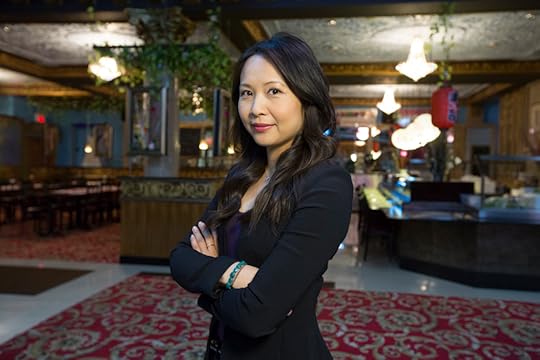
Ching-He Huang at the Shogun Palace in Queens, New York.
(Photo courtesy of Cooking Channel.)
October 18, 2013
On growth, competition, and saltine whistling
I was five years old, at a friend’s birthday party. It was 1975, so I was wearing some truly groovy plaid pants and a matching turtleneck. My mom had curled my hair into big fat sausages that hung all shiny and boingy around my face. I remember staring at the leg of those pants when the birthday girl’s mother announced the next party game: she was going to give everyone a big handful of saltines, and we were to stuff as many as we could into our mouths, and the first one to be able to whistle would win. I never won at party games, so I wasn’t particularly enthusiastic about this one, but I was absolutely okay with stuffing a fairly unsafe number of crackers into my mouth, so I went along with it.
To this day I can remember the dryness of the crackers as I pushed them around in my mouth, rooting for enough moisture to hold them in place so I could make a little cracker tunnel and get a whistle out. I remember my friends’ faces all around me, all the kids trying to whistle, everyone laughing, cracker crumbs and kid spit flying everywhere.
And then I whistled. I looked around, wondering if that dry, scraggly sound had, in fact, issued forth from my head. Why yes, yes it had. I whistled again. My friends cheered. The birthday girl’s mother gave me a prize, and although I can’t remember anymore what it was, I can remember the thrill of winning. The absolute rush of knowing I’d won.
By the time I got to high school, my friends were a little tired of me saying, “How about that whistle, huh? Right through those crackers!” every time I passed them in the hall, so I moved on to band competitions, play tryouts, the honor roll. The more times I could come out on top, the better. When I was a young newspaper reporter – forget about it. If I couldn’t take first place at any journalism competition I entered, I grabbed my toys and went home. I was always taught that competition is good, even healthy, because it keeps you at the top of your game. Whatever game that happens to be. And if you threw an elbow or two as you neared the finish line, oops. Competition means keeping your eye on the guy next to you, always making sure you’re a step ahead of him.
These days, I find that kind of competitiveness has lost its allure. I still like winning (these days I’ve graduated from saltines to corn chips and the only whistling I do is for another margarita) but I somewhere along the way, I realized the way I had begun to compete had totally changed. And not for the better.
This dawned on me a couple of weeks ago after I’d been meditating. Perhaps it was the clear calmness of my mind but whatever the reason, the truth broke over me like a water balloon full of reality: I have spent my entire life competing with other people. Most of the time it’s not even a formal, organized competition. It’s me looking around and comparing myself with most everyone I see. She’s skinnier than me, his car is cooler than mine, her haircut looks better than mine, she got a promotion at work and I didn’t, and most recently, he’s sold more books on Amazon than I have.
That day, right there in my writing room, at 44 years of age, it finally sank in how pointless, how fruitless, how damaging that is. And how very much I needed to jettison that thinking, like, yesterday. This is what I realized with absolute, perfect clarity:
If I’m comparing myself to someone else physically, that’s pretty lame. First of all, it’s shallow. Second of all, I’m most likely zeroing in on something that neither of us can change. I could try getting myself stretched on a rack but odds are I’m not going end up with twelve-foot legs like that model I saw walking in midtown Manhattan.
If I’m comparing myself to someone work-wise, it’s also pointless. I’m a writer – an artist. Comparing myself to other writers would only make me try to change my style to be more like theirs. Why would I do that? If I succeed, I’ve lost everything. Creative influences are one thing (hi, Philip Roth, still here!), but trying to become like someone else will only suffocate me. I’ve worked for years to develop my own voice, and watching it evolve organically is one of the greatest joys of my life. If someone else is having more success than me at any given time, so what? I’m not trying to be the first one to whistle through a mouth full of crackers anymore. If I’m true to myself and my style, the success I want will follow. It always has.
Neither can I use what other people say or do to compare myself to them, as others will usually say what they wish to be true, not what is. Too much guesswork, too much shooting in the dark there.
So what that leaves, then, is the soul. And since I can’t see into another person’s soul, that just leaves mine. Just my soul, and all that it holds, all that it is, all that it can be. So when I strip away everything else, all that matters is my soul, and how I choose to nurture it, how I choose to share it with the universe, and what place it occupies within that universe.
My responsibility is to my own soul. That’s where my efforts at improvement and beautification and growth must be directed. Right here, in my own unique and beautiful soul. What a rush of freedom and absolute perfect peace came with that realization.
I win.
October 13, 2013
I’m here, but not really. See you later.
There are millions folded into trillions of reasons I love being a creative type. I love the way the Muse nudges me to my writing desk, even at inopportune times, I love the feeling of looking at the clock and realizing I’ve been lost in my work for four hours, I love reading back over things I’ve written in the past and thinking “Hey! I’m pretty good at this!”
But what I don’t love are the dry spells. I wish more than anything I could tell you that I have a steamer trunk full of ideas that I keep in the corner of my brain and, like Mary Poppins’ carpet bag, it is never empty. But the truth is, sometimes I’m just out. Out of ideas, out of steam, I have nothing worthwhile to say and I’m not one of those people who thinks that just because you don’t have anything to say doesn’t mean you should be quiet. Most of the time anyway.
It’s hard, as a creative person, to admit that some days it’s just not there. And when you, like I do, have a blog and a podcast that help keep your name in front of people and brand you as a writer, those sticky, dark, non-creative days feel almost dangerous, like a cracked and dripping alleyway that you know is a shortcut home but you also know could get you cut to ribbons.
Trying to force creativity doesn’t work either, as most artists will tell you. The days I didn’t want to write but forced myself to sit in front of my laptop anyway were the days I belligerently played Candy Crush and put up Expensive French Style Decorating Ideas I Will Never Be Able to Afford and 45,000 Calorie Cake Recipes on Pinterest and did no writing at all. That’ll show me who’s boss around here.
And that, I think, pretty much catches you up on why I didn’t write a blog post all last week, nor did I record a podcast. This writer’s block, creative slump, whatever it is, will shift soon. It always does. In the meantime, here’s an awesome review for my debut novel: http://ow.ly/pM77a. Or you can always just scroll down and take another peek at Danny Blue Eyes. Either way, enjoy and I’ll see you back here later in the week.
October 4, 2013
The inspiration of Daniel Radcliffe
I had the opportunity this week to sit in on a radio interview with actor Daniel Radcliffe. I wasn’t doing the interview, so it gave me the chance to sit back and just listen. Granted, me being me, I did end up asking a question and we engaged in a little banter, and while I was cool and professional on the outside, only to you can I admit that inside, I was little more than a 15-year-old fangirl squealing “OMG HARRY POTTER!” over and over at the top of her lungs like a 33 record played at 45. With a skip.
But what struck me the most, to be honest, was what he said – everything he said – about his life, his career, what he looks for in roles post-Potter, and how, at the age of 24, he has stayed down-to-earth despite having been the biggest child star since, well, ever. And I had a brief chat with him after the interview, so I can testify to the fact that he really is just a nice, regular guy. And in case you’re wondering, he found it very funny that my last name actually is Potter.
He was doing the interview to promote his new movie, “Kill Your Darlings,” in which he plays Beat poet Allen Ginsberg, and he said this particular project is the one he’s been the most proud of since he retired the ol’ elder wand. The interview is going to air on SiriusXM radio next week so I’m not going to go into detail here and steal their thunder (because I’m sure if there’s anything that presents them with real competition, it’s this blog) but I was really impressed with his outlook and the ways in which he pushes himself as an actor. It doesn’t matter how good you are, he said, it’s about longevity. And in order to achieve the kind of longevity he wants for himself, he is constantly looking for new and different roles.
(If you want a little sneak preview of the interview, you can click here: http://ow.ly/pvUoH)
In “Kill Your Darlings,” Radcliffe plays Ginsberg complete with a curly mop of hair, nerdy-before-nerdy-was-hip glasses, and a surprisingly believable American accent. Upcoming projects include an offbeat movie called “Horns,” based on a book by Joe Hill (Stephen King’s son), and one called “The F Word” (F stands for friendship, relax) that will be out early next year. He denied rumors that he’s slated to play Freddie Mercury in a future film, which is kind of too bad. With the acting chops he’s developed since he was first cast as Harry Potter at the age of 11, I’d like to see what he’d have done with a role as the Queen frontman.
But the one thing I took from listening to his interview was that Daniel Radcliffe has the same focus on his art that I do on mine: Keep growing. Keep pushing. Don’t be afraid of change, and never, ever let them slap a label on you. If you’re going to survive, if you’re going to be remembered for your contribution to your art, you can never sit back and think, “Wow, that was great. I think I’ll coast now…” unless you really mean to be done.
He’s a 24-year-old actor and I’m *mumble*mumble* years his senior, he’s British and I only pretend to be when I’m drunk, but there in the SiriusXM studios on Monday afternoon, we were nose-to-nose, artist-to-artist, and I realized for the first time, really and fully realized, that we’re all in the same boat. I don’t remember the last time I felt so encouraged, and so inspired.
Expecto Patronum indeed.

